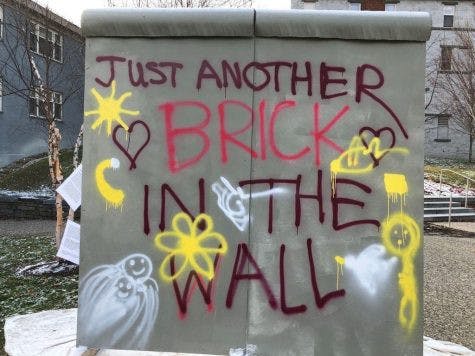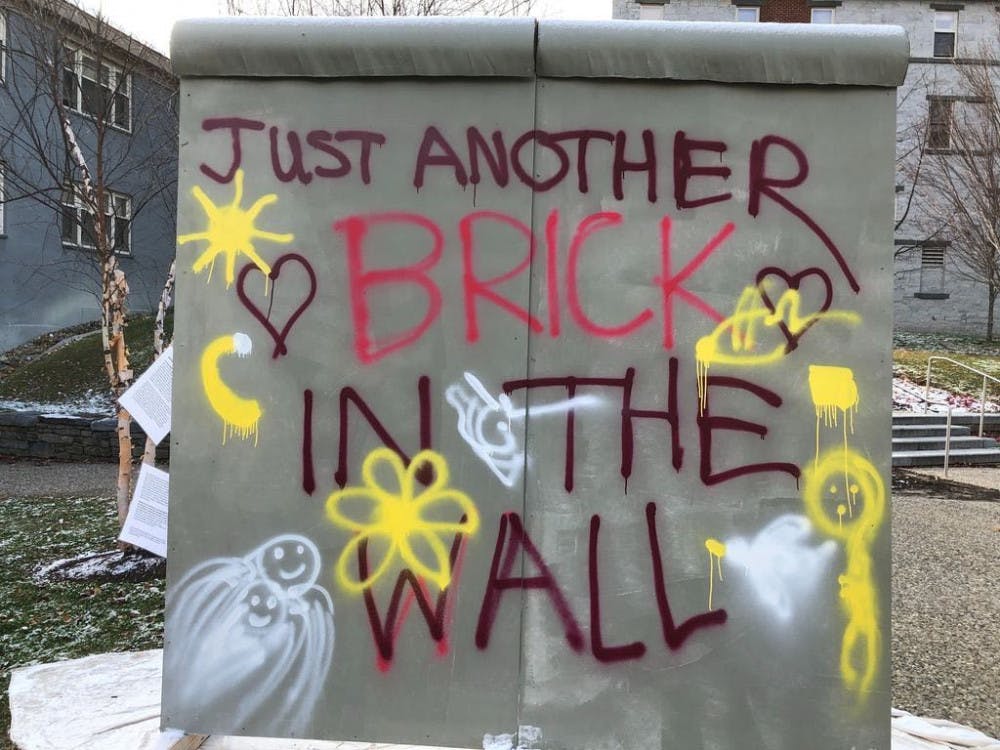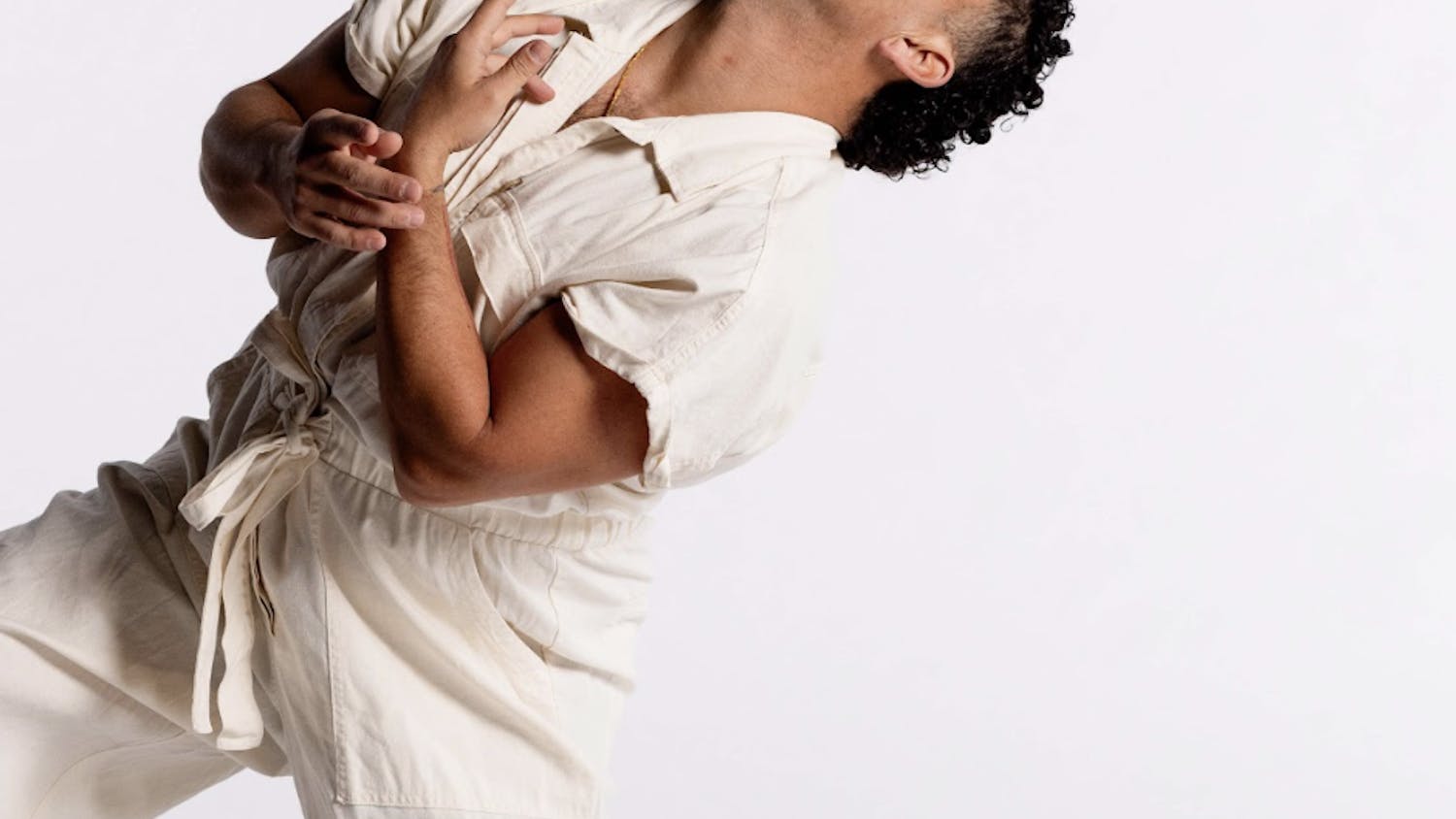This November marks the 30th anniversary of the fall of the Berlin Wall. The Wall, which separated East Germany and West Germany, stood for 28 years and served as a divider between the two countries both ideologically and physically, separating families and friends who once called the same country home. On Nov. 9, 1989, citizens took it upon themselves, hammers in hand, to demolish the barrier that had separated them from their family and friends on the other side.
The German Department, with the assistance from the German House as well as many other Language Departments, commemorated the momentous event in history this past week. Outside of Atwater Dining Hall, students of the German Department, residents of the German House and a handful of faculty members worked to construct a replica of the wall which stood for the entirety of last week. Ten years ago, a similar replica of the wall stood outside of Proctor Dining Hall.
Liz Sheedy ’22 and Ryan Kirby ’22 participated in the building of the wall. While the group was working to build something that would be torn down after just a week, the process was nonetheless a team building experience. The replica was constructed primarily of wood and drywall and was thus a challenge to carry from the German House, which is located next to Shafer’s Deli, to Atwater Dining Hall.
“Building the wall was such an intimate time together even though we were building something that is otherwise, especially historically, so much of a barrier,” Sheedy said.
Throughout the course of the week, students heeded the instructions posted on the wall by painting graffiti on it — the first of which to appear were the words “free palestine” — just as West Germans did along the wall throughout its existence.
The wall was not as covered in graffiti this year as it had been 10 years ago, perhaps due to the fact that the previous replica had been directly blocking entry into Proctor, thus forcing students to engage with it more. However, students still got involved with the project, through graffitti, as well as through daily speeches which were given in front of the installation, both by individuals, and representatives of both the College Democrats and College Republicans Clubs. These speeches worked to contextualize the project, as well as to reflect more deeply on the significance of the fall of the Wall and its enduring impact worldwide.


The idea for the project originated from the German Embassy eleven years ago to commemorate the 20th anniversary of the Mauerfall. In order to commemorate this anniversary, it was important for the organizers to host a party during which students and faculty could tear down the wall in similarly joyous ways in which they did 30 years ago.
“The building of the Wall and the tearing down of it, they go together,” said Bettina Matthias, Maurice C. Greenberg Professor of Language & Linguistics, who grew up outside of Berlin in then West Germany.
On Saturday night, those involved with the project invited the college community to this celebration, which was complete with food, a photobooth, drinks and music. Like West Germans in 1989, they took hammers and chisels to the Wall, slowly whittling the wall down until just beams stood along the border.
Matthias recalls a particularly vivid memory of this process, “for months, you could hear, day and night, the sound of metal on concrete as people chiseled away at the Wall, keeping pieces of it for themselves,” she said.
Matthias holds the fall of the Berlin Wall as one of the most memorable events in her life. Just as many Americans can tell you exactly where they were when they heard the news of the 9/11 terrorist attacks, most Germans can tell you exactly where they were when the border between the two countries was opened and the chipping away at the Wall began.
For her parents, who had lived through Hitler’s rise to power, had fled Germany during World War II, and who then saw the building of the Wall, its collapse was “one of the most surreal and joyful things in their entire lives,” Matthias said. While the end of the war restored some semblance of peace to Germany, the period following it was one of great change, of intense rebuilding as a country and in many ways the birth of a whole new world.
“Today, Berlin is such an epicenter in terms of democratization and industrialization and a lot of people think that it’s a great representation of what we are trying to be,” Kirby said. “It’s insane to think that just 30 years ago, just 10 years before a lot of us were born, the city was walled.”
On the same subject, Sheedy added, “Walls, like the Berlin Wall, not only block the movement of people but also the ability to learn or to understand, open our minds to things we refuse to think about or to broach.”
The “free palestine” motif was spray painted on the installation within hours of it being put up, challenging viewers to ponder the ways in which we can prevent history from repeating itself.
“There are still plenty of ‘Berlin Walls’ that still exist,” Sheedy said.
Students honor anniversary of fall of the Berlin Wall

BENJY RENTON/THE MIDDLEBURY CAMPUS
Comments



